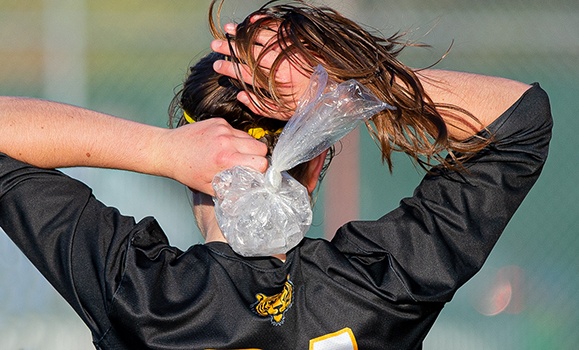Keeping Tigers student-athletes healthy is a real team effort at π˙√Ò≤ ∆±. Routed in the π˙√Ò≤ ∆± Physiotherapy Clinic (DPC), the π˙√Ò≤ ∆± Athletic Trainer Program (DATP) is where it all begins.
Athletic trainers provide ‚Äòon field‚Äô first aid and preventative care at practices and competition for the π˙√Ò≤ ∆± Tigers varsity and contact club teams. The program provides education in prevention and management of athletic injuries and exposure to the field of sports therapy. It‚Äôs a very popular opportunity for undergraduate students within π˙√Ò≤ ∆±‚Äôs School of Health and Human Performance to gain valuable hands-on experience to further their education and move on to careers in health care.
Run by therapy assistants and co-athletic trainer coordinators Declan O’Brien and Tessah MacDowall, the DATP receives an average of 70-90 applications for 45 athletic trainer positions each year. Once accepted, students are assigned to teams as a head trainer, assistant trainer or as part of the mentorship program, depending on experience.
Head trainers must have a minimum of one-year of experience as a trainer and provide leadership for assistant trainers and act as mentors. They are responsible for scheduling coverage at practices and lead communications between trainers, coaches and DPC staff. The mentorship program gives individuals who don’t have any previous experience an opportunity to be exposed to the DATP and learn as an observer.
Once assigned to a team, trainers play a vital role with the teams, one that Tigers head coaches like women’s volleyball coach Rick Scott sees as crucial.
‚ÄúThe trainer program has been a very important part of the success of our program over the years,‚Äù says Scott. ‚ÄúWe have had so many great trainers that are hard-working, committed and who genuinely care about our student-athletes.¬ÝThey go that extra mile to keep each athlete healthy, happy and safe.¬ÝThey are often the first to arrive at the gym to provide heat, taping or stretching and usually the last to leave after providing ice and care post-practice or after games.¬ÝOur trainers have really become an important part of our team - they join us for team-building activities and are always cheering us¬Ýon in matches.‚Äù
DATP participants receive educational and practical teaching components from Rhonda Reardon, clinic manager at the DPC and physiotherapists Joseph Ghosn and Kyle Crosby. The hands-on training gives them the tools they need to successfully care for Tigers athletes. The connection to the DPC also helps to ensure that student-athletes who are receiving care for injuries don’t push themselves beyond what their physiotherapist has prescribed.
The onset of COVID-19 hasn’t had as big an impact on the DATP as one might think. Being in the Atlantic Bubble, Tigers teams are able to train, which means they need the support of athletic trainers.
All trainers are required to wear a mask and ensure physical distancing from athletes and coaching staff when not providing direct care. And similar to the DPC adaptations, there are rigorous cleaning and sanitization processes in place. Additionally, all trainers must complete a COVID-19 screening questionnaire the day before and the day of team training coverage. The screening questionnaires are monitored by MacDowall and O’Brien.
The way in which the educational components of the program are delivered has changed with the on-set of COVID-19.
“We’re unable to all get together as a group now, so we’re currently delivering three of the four weeks of training online,” says MacDowall. “The fourth week covers practical skills so we break into small pods and have one instructor teach the skill and run through various scenarios trainers might run into.”
MacDowall has only been in the role for just over a year but believes strongly in the work being done.
‚ÄúComing from outside the π˙√Ò≤ ∆± community, I believe the DATP is one of the best around,‚Äù says MacDowall. ‚ÄúIt provides interested students with the opportunity to not only experience the sport therapy field, but also has numerous educational and mentorship opportunities they may not have the ability to experience elsewhere.‚Äù
MacDowall’s co-coordinator Declan O’Brien couldn’t agree more having started with the Tigers as a trainer in 2015 while pursuing a Bachelor of Science in Kinesiology. O’Brien spent three years in the DATP starting as an assistant trainer with the men’s soccer team for one season before taking on the role of head trainer the next two years. He also helped the basketball, rugby and lacrosse teams when needed.
“The program provided me with endless opportunities for networking and growth as a trainer within the program and externally,” says O’Brien. “I’m proud to be able to help provide those same opportunities for students in the program now and to play a role in ensuring the success and well-bring of our teams.”
As the rules and restrictions around sport continue to shift, so will the trainers and staff within the DATP.
For now, they will do everything they can to help prepare the Tigers teams for what comes next.

